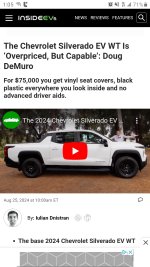But they ARE right. Those things are true.
No, it's not anywhere near as simple as "those things are true." They're, at best, sometimes true, sometimes false, sometimes in-between.
Highly dependent on several variables, but it's demonstrably true that the Lightning can be VERY competitive on price with similarly-equipped Pro/XL and XLT trims: Basically the same price as the gas version after available tax credits when comparing Supercrew 4WD.
Mine, in fact, cost WAY less than a comparable gas truck.
So, no, "they cost way more" is not "true". It can be true, but it's also often false, or "slightly more expensive" rather than "way more" expensive. Sometimes it's completely false and the EV is cheaper.
there's no place to charge them
Not simply "true". Plenty of people are doing long trips in EVs, have owned them for a decade, use them as their primary vehicles, etc.
they take 5 hours to charge on a trip,
This is very rarely true. Most road trip charges take ~30 mins, give or take 15 mins.
and the range is insufficient for their use case.
Sometimes true, sometimes false. Here, talking about Overlanding, it's more likely to be true, but for many people, it's nowhere near as simple as "sufficient or insufficient". It's technically sufficient for a large number of people, but it's a trade-off with the other advantages like home charging, etc.
Boiling these all down to "those things are true" is, at best, overgeneralization.
It is a very small (for now) group of people for whom an EV makes perfect sense. And theres another group of people with one foot on the boat and one foot on the dock...they would like to, or have switched, even though the benefits for them personally could go either way.
I've said this plenty of times: There's a continuum of EV vs ICE as far as people's use case and how they work for each person.
There are some cases where an EV is the obvious choice (many multi-car families), some cases where an EV obviously aren't the right choice (frequent long-distance towing, etc.), and a ton of people in the middle who need to weigh the pros and cons based on facts, not based on commonly-held but often inaccurate perceptions.
Every reasonable person knows it's a continuum, and not "EVs work for everyone" or "EVs don't work for anyone."
perception is 9/10ths of the truth.
When it comes to sales? Sure.
When it comes to objective facts? Definitely not.
Perception has zero direct influence on the fact that a Lightning Pro and a zero-option gas Supercrew 4x4 are the same effective price. Even if everyone perceives the Lightning is more expensive, that doesn't make it 9/10ths true.
Perception doesn't make it true that DC Fast Charging a Lightning takes 5 hours. It still takes ~30 mins regardless of what anyone perceives to be true.
If the claim is "lots of people think this is true, so it will affect sales", then sure. If the claim is "this is true", then no, it's not.


